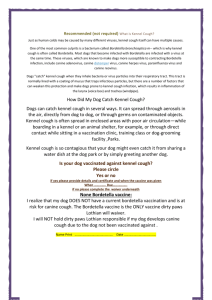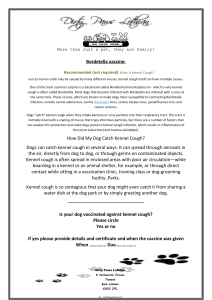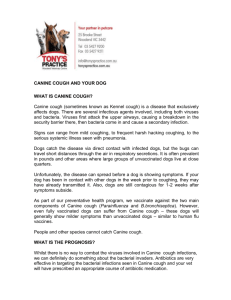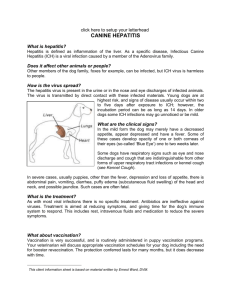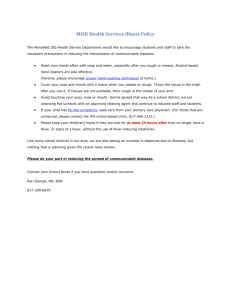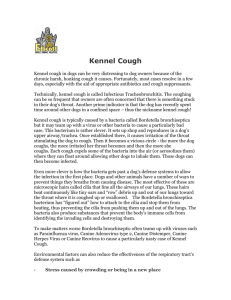Kennel Cough: Questions and Answers
advertisement
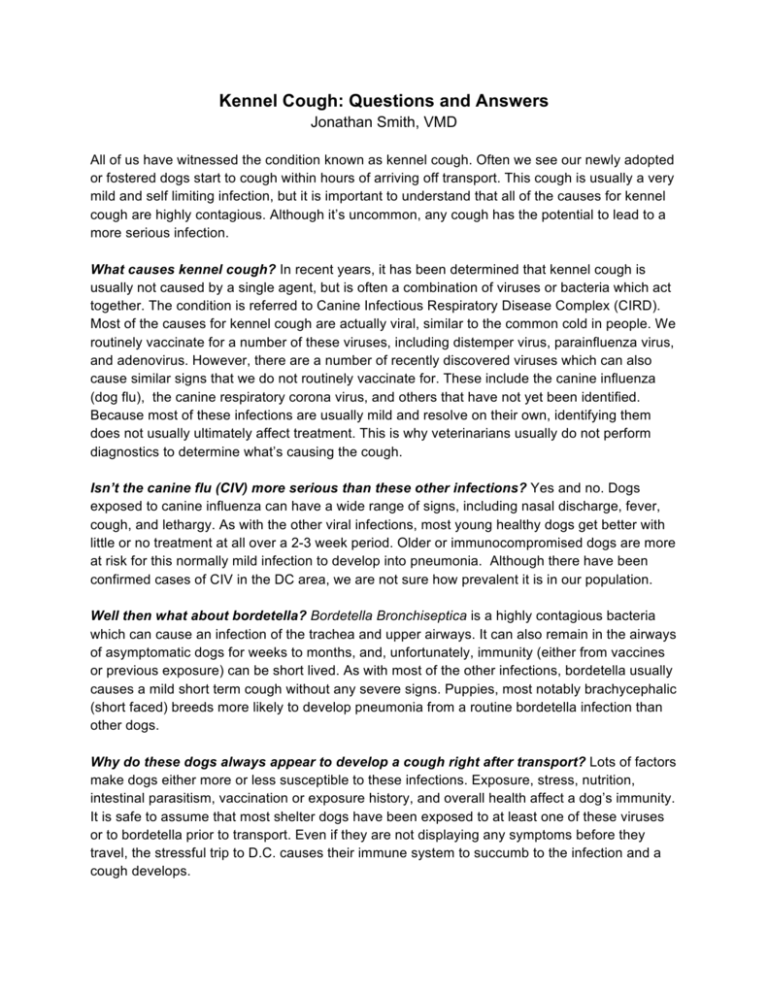
Kennel Cough: Questions and Answers Jonathan Smith, VMD All of us have witnessed the condition known as kennel cough. Often we see our newly adopted or fostered dogs start to cough within hours of arriving off transport. This cough is usually a very mild and self limiting infection, but it is important to understand that all of the causes for kennel cough are highly contagious. Although it’s uncommon, any cough has the potential to lead to a more serious infection. What causes kennel cough? In recent years, it has been determined that kennel cough is usually not caused by a single agent, but is often a combination of viruses or bacteria which act together. The condition is referred to Canine Infectious Respiratory Disease Complex (CIRD). Most of the causes for kennel cough are actually viral, similar to the common cold in people. We routinely vaccinate for a number of these viruses, including distemper virus, parainfluenza virus, and adenovirus. However, there are a number of recently discovered viruses which can also cause similar signs that we do not routinely vaccinate for. These include the canine influenza (dog flu), the canine respiratory corona virus, and others that have not yet been identified. Because most of these infections are usually mild and resolve on their own, identifying them does not usually ultimately affect treatment. This is why veterinarians usually do not perform diagnostics to determine what’s causing the cough. Isn’t the canine flu (CIV) more serious than these other infections? Yes and no. Dogs exposed to canine influenza can have a wide range of signs, including nasal discharge, fever, cough, and lethargy. As with the other viral infections, most young healthy dogs get better with little or no treatment at all over a 2-3 week period. Older or immunocompromised dogs are more at risk for this normally mild infection to develop into pneumonia. Although there have been confirmed cases of CIV in the DC area, we are not sure how prevalent it is in our population. Well then what about bordetella? Bordetella Bronchiseptica is a highly contagious bacteria which can cause an infection of the trachea and upper airways. It can also remain in the airways of asymptomatic dogs for weeks to months, and, unfortunately, immunity (either from vaccines or previous exposure) can be short lived. As with most of the other infections, bordetella usually causes a mild short term cough without any severe signs. Puppies, most notably brachycephalic (short faced) breeds more likely to develop pneumonia from a routine bordetella infection than other dogs. Why do these dogs always appear to develop a cough right after transport? Lots of factors make dogs either more or less susceptible to these infections. Exposure, stress, nutrition, intestinal parasitism, vaccination or exposure history, and overall health affect a dog’s immunity. It is safe to assume that most shelter dogs have been exposed to at least one of these viruses or to bordetella prior to transport. Even if they are not displaying any symptoms before they travel, the stressful trip to D.C. causes their immune system to succumb to the infection and a cough develops. How contagious are these agents? Unfortunately, all of the causes for kennel cough are highly contagious. Most infections are spread through aerosol (moisture droplets) from sneezing or coughing, and also through fomites. A fomite is any object which can transport the virus including people, clothing, shoes, or anything which is moved from one area to another. Veterinarians recommend that any dog that is suspected of having kennel cough be isolated from other dogs for 14 days, however they are usually only contagious for the first 7-10 days of illness. Of course, isolating dogs is often not a possibility for a foster or for newly adopted dogs, but the next paragraph explains why we are willing to risk exposure. Should I be worried about bringing a coughing dog home? As we just discussed, most of the agents are highly infectious to other dogs. Whether a dog develops a cough from these viruses is entirely dependant on their immunity, which is shaped by their previous exposure (doggie day care etc) or vaccinations. Most young, healthy, vaccinated dogs are not at risk of becoming very sick from exposure to a new house mate. Similar to sending your children to school, there is always the risk of a dog developing a cough despite being the healthiest dog on the block. The more important point is that these infections are almost always mild, short lived and should not cause any lasting harm. If most of these infections are viral, why does my veterinarian often treat with antibiotics? As in people, most viral infections cannot be treated directly. The main concern with a primary viral infection is that a secondary bacterial infection can develop. By treating with antibiotics, we can decrease the chance that a cough will develop into pneumonia. In addition, because bordetella is a bacteria and not a virus, it is very susceptible to an antibiotic called doxycycline. Thus, a course of doxycycline not only treats the bacteria but also can also limit the period in which it is contagious to other dogs. When and why should I vaccinate? Unfortunately, immunity to bordetella is short lived, and most veterinarians recommend that any dog at high risk (doggie day care, grooming facilities, boarding facilities etc) be vaccinated as often as every 6 months. The vaccination can be either intranasal or injectable. Both of these work well, however the intranasal is much quicker in providing an immune response. There is also a vaccination for CIV (canine flu) available, and although we do not know how common CIV is in our local dog population, veterinarians currently recommend the vaccine for any dogs who fall within that same high risk category. As with the flu vaccine in people, none of these are 100% protective. Most boarding facilities require these vaccinations not just for your dog’s well being, but also to keep the prevalence of these infectious agents to a minimum in their facility. When should I be concerned that this is more serious than kennel cough? It is important to understand that there are many causes for coughing in dogs. If a cough is from CIRD your dog would have a history of interaction with other dogs, and the cough would start within the first week or so after exposure. The main concern with CIRD is it’s potential to lead to pneumonia, which is an infection of the lungs. If your dog’s cough persists for more than 3 weeks, if your dog becomes lethargic, stops eating, or is having difficulty breathing, he or she should be evaluated by a veterinarian as soon as possible. Heart disease, heartworm infection, lower airway disease (similar to asthma or COPD in people), parasitic or fungal infection, cancer and others are all possible causes for a cough. If a cough slowly progresses over weeks to months, and is unresponsive to antibiotics, it may not be a simple case of kennel cough. A physical exam by a veterinarian and chest x-rays are usually the next step to evaluate the lungs and airways. If you ever have any questions or concerns about your dog’s cough, please please do not hesitate to contact or visit your local veterinarian.
